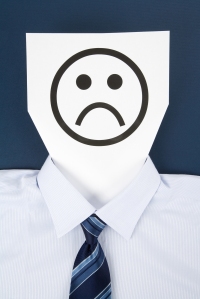There’s a complexity to language; words color what we think, say and do. With our locutions, we praise and condemn, stumble upon transitory meanings and conniptions and try to make sense of things both ordinary and profound. What words we use to describe ourselves and others says a lot about the world we live in.
“I’m a loser, a failure,” my buddy said through sad eyes as he looked across at me.
Tom’s 50 years old and been struggling with anxiety and depression for the past fifteen years. I have witnessed the arc of his demise, his struggle to keep depression’s wolves at bay. There had been red flags along the way – a bad temper, divorce, drinking too much and a lot of self-condemnation. But my friend had long felt that these were justified by what the adversarial nature of the law had saddled him with. He didn’t see – until now – his role in creating the mess that his life was now in. Only pain, unrelenting pain, had broken him open. It had humbled him and given him the opportunity to honestly examine his life.
As my friend spoke on, it seemed to me that he wasn’t only seeking better mental health – that seemed to be unattainable for him during this low tide – but a sort of redemption; not in any great religious sense, though he certainly would’ve welcomed any help of the divine variety.
The redemption he was hoping for and seeking was a second chance at life. He wasn’t sure whether he deserved it; but he was hopeful that he would be given one. A second chance to make better choices in his life; to stop going down mental and emotional dead ends that only strengthened depression’s vise-like grip on his life. Ultimately, the restoration of a fundamental goodness and harmony that had been so long absent.
Tom’s brokenness seemed not just about his depression, but cracks in his soul. In his misguided efforts to squelch his bottoming-out, he often did self-destructive and self-defeating things – anything to soothe those acerbic rants of depression. But the rants inside his head didn’t stop – they only got louder.
Perhaps they were trying to tell him something, I suggested. “No they’re not”, his psychiatrist had assured him. “It’s just part of the disease of depression, pure and simple”. Yet I believe that such advice did more harm than good. No doubt Tom, given his incapacitated state, could probably benefit from some medication. But he could also benefit from trying to discern the signposts contained inside the depression that might lead him out of the swamplands.
 Author Lee Stringer, in the book Unholy Ghost: Writers on Depression, writes:
Author Lee Stringer, in the book Unholy Ghost: Writers on Depression, writes:
“One grows older and more knowing over time; life’s more facile charms grow dim; the soul yearns, seeking more than could ever be had on this earth, more than could ever be wrought out of three dimensions and five senses. We, all of us, suffer some from the limits of living within the flesh. Our walk through the world is never entirely without that pain. It lurks in the still, quiet hours which we, in our constant busyness, steadfastly avoid. And it has occurred to me since that perhaps what we call depression isn’t really a disorder at all but, like physical pain, an alarm of sorts, alerting us that something is undoubtedly wrong; that perhaps it is time to stop, take a time-out, take as long as it takes, and attend to the unfinished business of filling our souls.
The aridity of our soul calls out to be watered by a greater relationship to the Universe, called by many God. This Mystery is concerned not only with the building up of better mental health, but also our engagement with the larger questions of life: Why was I born? Who am I? What is my life’s purpose? What is the meaning of life? Why have these Job-like tragedies befallen me? The ancient Greek’s talked about Fate and Destiny, modern-day philosophy calls it existentialism. But, they’re all ultimately concerned with the same thing – a jettisoning of friviloius, superficial and hedonistic pursuits and the journeying towards wisdom and a wider vision of what this life is truly about.
In some sense, we can be worn out by such intense probing. But the questions won’t go away, as if demanding our response. When we give up engaging with these larger questions in life, we are inevitably diminished in some fundamental way. We “settle” for a more predictable and smaller life that we often regret later on – the roads not taken. But when we meet these questions, when we finally stop running away from life, we can begin to respond to our soul’s deepest yearnings.
Thomas Moore, in his best-selling book, Care of the Soul: A Guide for Cultivating Depth and Sacredness in Everyday Life, writes:
“The soul presents itself in a variety of colors, including all the shades of gray, blue, and black. To care for the soul, we must observe the full range of all its colorings, and resist the temptation to approve only of white, red, and orange – the brilliant colors. The “bright” idea of colorizing old black and white movies is consistent with our culture’s general rejection of the dark and the gray. In a society that is defended against the tragic sense of life, depression will appear as an enemy, an unredeemable malady; yet in such a society, devoted to light, depression, in compensation, will be unusually strong.”
Looking into my friend’s weary eyes, I don’t tell him he’s mentally ill or that he deserves his pain for all the bad mistakes he’s made – he’s already been told this by others. I don’t tell him to get help, because he already knows that and is getting help. I don’t even tell him that it’s terrible that he’s experiencing depression
What I do tell him is that something or someone essential –something beyond just recovering from depression – is missing from his life. I don’t pretend to know what or who that is; we each have a unique relationship with life. But I tell him that he will have to search for that essential thing or person – and it might not come easy. But it’s in living the big questions that we are somehow healed, perhaps slowly, and recover a sense of meaning to our lives which is, after all, what our souls truly want.
My friend needs a renewal, a change of course, another chance – a real shot at redemption.



















